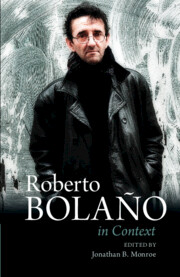Book contents
- Roberto Bolaño in Context
- Roberto Bolaño in Context
- Copyright page
- Contents
- Contributors
- Chronology
- Part I Geographical, Social, and Historical Contexts
- Chapter 1 Mapping Bolaño’s Worlds
- Chapter 2 Chile, 1953–1973
- 3 The Pinochet Era, 1973–1990
- Chapter 4 Dictatorships in the Southern Cone
- Chapter 5 Mexico City, 1968
- Chapter 6 Mexico City, Paris, and Life versus Art
- Chapter 7 Spain, Europe: 1977–2003
- Chapter 8 Transnational Currents: Europe and the Americas
- Part II Shaping Events and Literary History
- Part III Genres, Discourses, Media
- Part IV Aesthetics, Culture, and Politics
- Further Reading
- Index
Chapter 4 - Dictatorships in the Southern Cone
from Part I - Geographical, Social, and Historical Contexts
Published online by Cambridge University Press: 15 December 2022
- Roberto Bolaño in Context
- Roberto Bolaño in Context
- Copyright page
- Contents
- Contributors
- Chronology
- Part I Geographical, Social, and Historical Contexts
- Chapter 1 Mapping Bolaño’s Worlds
- Chapter 2 Chile, 1953–1973
- 3 The Pinochet Era, 1973–1990
- Chapter 4 Dictatorships in the Southern Cone
- Chapter 5 Mexico City, 1968
- Chapter 6 Mexico City, Paris, and Life versus Art
- Chapter 7 Spain, Europe: 1977–2003
- Chapter 8 Transnational Currents: Europe and the Americas
- Part II Shaping Events and Literary History
- Part III Genres, Discourses, Media
- Part IV Aesthetics, Culture, and Politics
- Further Reading
- Index
Summary
This essay explores references to military dictatorships in the Southern Cone of Latin America in Roberto Bolaño’s novels, most specifically in Nazi Literature in the Americas, Distant Star and By Night in Chile. Much of Bolaño’s writing referencing the human rights abuses in the Southern Cone unpacks the relationship between literary ethics and literary politics in relation to repressive political regimes. Although his poetics have been shaped by the legacies of military terrorism and impunity in Latin America, Bolaño distances himself from other writers of post-dictatorship literature in two ways: he does not employ reparation narrative as a means of coming to terms with trauma, nor does he attempt to speak on behalf of victims. His fictions only rarely center on traumatized victims who seek a suitable language for restitution. Instead, his literary mind charts the social web that allowed violence and disappearances to seize hold of the society following the reasoning of the military state. I contend that spectral haunting is the essence of Bolaño’s writing and that his unsettling literary accounting of violence conjures up a ghostly world of the disappeared that shows his readers how to hear and listen to those ghosts.
Keywords
- Type
- Chapter
- Information
- Roberto Bolaño In Context , pp. 46 - 56Publisher: Cambridge University PressPrint publication year: 2023

